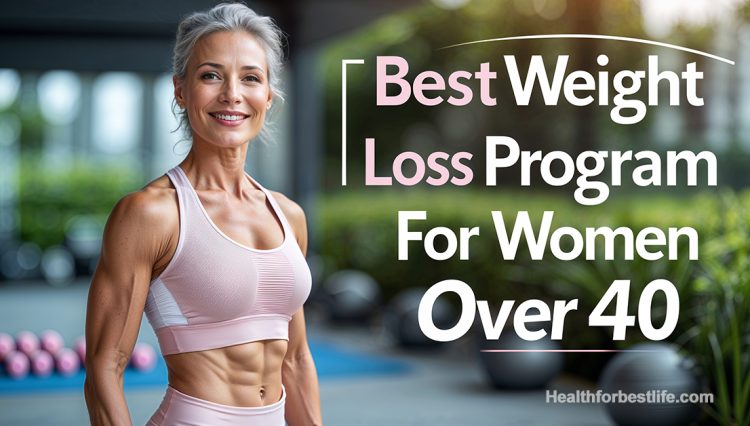Best Weight Loss Program For Women Over 40
Staying Healthy and Strong After 40: A Practical Guide
Turning 40 isn’t just a milestone. it’s an invitation to re-imagine what health and happiness look like. Life feels different, and your body starts to nudge you with gentle reminders. Maybe it’s a bit harder to bounce back after a long day or your favorite foods don’t sit quite as well as they used to.
These shifts aren’t roadblocks they’re opportunities. Your 40s are the perfect time to invest in yourself, building habits that support your energy, strength and resilience for the long haul. This guide offers practical, sustainable steps to keep you feeling vibrant and capable. Because life after 40 is just getting started.

Understanding and Adapting to Changes in Your Body
Recognizing and embracing your body’s changes is key to adapting habits for optimal health.
Let’s be honest. hitting 40 can feel like a wake-up call. Suddenly, things you took for granted like quick recoveries after workouts or endless energy aren’t as automatic anymore. That’s not failure, it’s biology.
Take Jessica, for example. At 41, she started experiencing frequent fatigue after her usual morning runs. Instead of powering through she listened to her body. She swapped one high-intensity session for a restorative yoga class and added more protein to her diet. The result? Less fatigue and better overall balance.
Changes in metabolism, hormone levels, and recovery time are natural at this stage. For women, perimenopause may bring fluctuating estrogen levels, affecting sleep, mood and energy. Men may experience decreased testosterone impacting muscle mass and stamina. The key is recognizing these shifts and adjusting your habits accordingly.
How to Adapt:
- Track what works: keep a log of activities, foods or routines. that energize or drain you.
- Experiment With Variety: If running feels too hard, try cycling or swimming instead.
- Prioritize Joint Health: Include low-impact exercises and stretches to maintain flexibility and reduce strain.
This isn’t about fighting your body. it’s about learning to partner with it.

Building Strength and Resilience Through Exercise
Strength training preserves muscle, boosts metabolism, and prepares you for everyday life.
Strength training after 40 isn’t optional, it’s essential. As we age muscle mass naturally declines a phenomenon called sarcopenia. Left unchecked it can lead to reduced strength, balance issues, and increased risk of injury. The good news? A consistent strength training routine can counteract these effects and even reverse some of them.
Consider Matt a 44-year-old IT consultant. He was never a gym enthusiast but began strength training after struggling to carry his toddler up the stairs. Starting with 15-minute sessions twice a week, Matt noticed significant improvements in his energy and stamina within months.
Strength training doesn’t mean spending hours lifting heavy weights. Body-weight exercises like squats, push-ups and planks are great starting points. Over time, adding resistance bands or light dumbbells can help you progress. Beyond physical benefits strength training boosts your confidence. You feel capable of taking on life’s challenges whether it’s lifting groceries or tackling a weekend hike.
Key Tips:
- Focus on Functional Strength: Prioritize exercises that mirror everyday movements like dead-lifts or lunges.
- Incorporate Variety: Mix strength training with balance exercises to improve overall mobility.
- Commit to Consistency: Two to three sessions a week are enough to see meaningful results.

The Importance of Whole Foods for Health and Energy
Whole foods fuel your body, stabilize energy and promote long term health benefits.
After 40 your body thrives on nutrient-dense whole foods that provide steady energy and essential vitamins. Processed snacks and sugary treats might give you a temporary boost but they often lead to energy crashes, inflammation and long-term health challenges.
Picture this: Sarah, a busy 46-year-old teacher relied on convenience foods like chips and pre-packaged meals during her hectic workweeks. After noticing frequent bloating and fatigue, she revamped her diet, swapping processed options for whole foods like lean proteins, roasted veggies, and quinoa. Within weeks, her energy levels stabilized, and she even lost a few pounds.
Whole foods—think fruits, vegetables, whole grains, lean proteins, and healthy fats—offer sustained energy and support your body’s changing needs. Leafy greens like spinach and kale are packed with vitamins, while salmon and walnuts provide heart-healthy omega-3s. These aren’t just meals; they’re investments in how you’ll feel tomorrow.
Practical Strategies:
- Plan Ahead: Meal prep on Sundays to have ready-to-go, nutritious options during the week.
- Go for Color: Build meals that include at least three different colors of fruits and vegetables.
- Enjoy Treats Mindfully: Balance indulgent foods with nutrient-dense choices rather than aiming for perfection.

The Value of Hydration for Overall Well-being
Staying hydrated supports digestion, focus, energy, and skin health as you age. Aim for at least eight glasses of water daily and consider adding electrolytes after intense workouts.
Prioritizing Sleep for Recovery and Mental Clarity
Sleep restores your body, sharpens focus and prepares you for daily challenges. Develop a calming bedtime routine such as reading or meditating to ensure consistent quality rest.
Simplifying Eating Habits with Structure
Structured meals simplify decisions and promote consistent, mindful eating habits. Focus on balanced meals with protein, healthy fats and fiber to keep you satisfied and energized.
Balancing Wellness with Joy and Sustainability
Sustainable habits prioritize health while leaving space for enjoyment and flexibility. Celebrate progress, indulge occasionally and focus on what makes you feel good in the long term.

Conclusion: Embrace Your Best Years With Confidence and Care
Your 40s are more than a new chapter. they’re a chance to rewrite the story. By listening to your body, embracing change and making thoughtful adjustments, you can create a life filled with strength, vitality and joy.
Remember, health isn’t about perfection; it’s about progress. Some days, you’ll crush your goals; other days, you’ll rest—and both are equally important. Celebrate your journey, knowing that the small steps you take today will shape the vibrant future you deserve.

